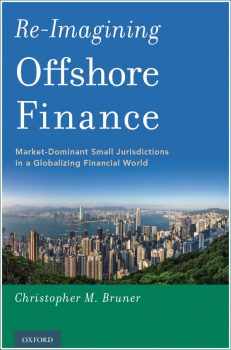W&L Law Professor’s New Book Examines Small Jurisdictions in Cross-Border Finance A new book by Washington and Lee law professor Christopher Bruner explores how “offshore” financial markets emerged and rose to prominence.
The 2016 release of the so-called “Panama Papers” detailing the financial holdings of numerous politicians and affluent individuals from around the world, and recurrent news accounts of companies such as Apple reducing their tax liabilities through foreign subsidiaries, have shone a bright light on the mysterious world of “offshore” finance. Trillions of dollars are now held outside New York, London, and other major-market financial centers, and a handful of small jurisdictions have accordingly become major players in cross-border corporate and financial services.
A new book by Washington and Lee law professor Christopher Bruner explores how these “offshore” financial markets emerged and rose to prominence. Titled Re-Imagining Offshore Finance: Market-Dominant Small Jurisdictions in a Globalizing Financial World, the book is now available from Oxford University Press.
The secrecy and opacity associated with these small jurisdictions have led critics to claim that they profit solely by facilitating money laundering and tax evasion. Others respond, however, that such jurisdictions offer real and legitimate benefits, including specialized expertise and increased competition, as well as financial and regulatory innovations.
Given the controversy, Bruner says the time is ripe for a thorough analysis of these growing markets.
“The nature, legal status, and market roles of small jurisdictions remain under-theorized,” says Bruner. “Lacking a sufficiently nuanced framework to describe their functions in cross-border finance – and the peculiar strengths of those achieving global dominance in the marketplace – it remains impossible to evaluate their impacts in a comprehensive manner.”
In the book, Bruner advances a new conceptual framework to refine the analysis and proposes a new concept that better captures the characteristics, competitive strategies, and market roles of those achieving global dominance in the marketplace – the “market-dominant small jurisdiction” (MDSJ). Bruner’s account focuses on the central features giving rise to the MDSJs’ strengths – some reflecting historical, cultural, and geographic circumstances, while others reflect development strategies responding to those circumstances – and emphasizes their striking ability to bridge major-market economies and financial centers.
Through this lens, Bruner evaluates a range of small jurisdictions that have achieved global dominance in specialized areas of cross-border finance, including Bermuda, Dubai, Singapore, Hong Kong, Switzerland, and Delaware.
“The MDSJs’ significance will likely continue to grow,” Bruner concludes, “as will the need for a more effective means of theorizing their roles in cross-border finance and the global dynamics generated by their ascendance.”
Re-imagining Offshore Finance is now available from Oxford University Press, as well as Amazon and other booksellers.
Praise for Re-Imagining Offshore Finance
“Christopher Bruner’s important and timely book convincingly argues that we need to take seriously a handful of small jurisdictions that, for better and worse, have managed to compete for ever-increasing shares of the market for cross-border finance. Through a careful study of the institutional features of a number of jurisdictions, Bruner identifies a special group, ‘market-dominant small jurisdictions,’ that have excelled in this competition, and distills the essential factors leading to their success. This is a major contribution to the literature.”
Erin O’Hara O’Connor, Dean and McKenzie Professor of Law,
Florida State University College of Law
“Are tax havens good or bad? Professor Bruner brings a fresh new perspective to this tantalizingly simple question in his book Re-Imagining Offshore Finance. By engaging an impressively broad scope of literatures and breaking through old, unhelpful labels, Bruner is able to identify fascinating new themes in offshore tax and financial competition. In bringing to light the concept of ‘market-dominant small jurisdictions,’ Bruner helps move the intellectual debate forward in a truly novel and important way.”
Adam Rosenzweig, Vice Dean for Academic Affairs and Professor of Law,
Washington University School of Law
About the Author
Christopher M. Bruner is the William Donald Bain Family Professor of Corporate Law at Washington and Lee University, where he also serves as Director of the Frances Lewis Law Center. His teaching and scholarship focus on corporate law and securities regulation, and he has been a visitor to the law faculties of the University of Cambridge, the University of Hong Kong, the University of Leeds, the University of Sydney, the University of Toronto, the National University of Singapore, and the Southwest University of Political Science and Law (Chongqing, China). He has twice traveled to the Russian Federation at the invitation of the U.S.-Russia Foundation for Economic Advancement and the Rule of Law (USRF) to participate in discussions with commercial court judges and economic ministry officials regarding Russian corporate law reform and potentially useful models from U.S. corporate and securities law. Bruner received his A.B., M.Phil., and J.D. from the University of Michigan, the University of Oxford, and Harvard Law School, respectively.
Bruner’s first book, Corporate Governance in the Common-Law World: The Political Foundations of Shareholder Power (Cambridge University Press, 2013), has been called “a revelation” and “a work of monumental significance and scholarly craft,” and has been translated into Chinese (Cambridge University Press & Law Press China, 2016). In the book, Bruner develops a new political theory to explain why shareholders in the U.K. and other common-law jurisdictions are both more powerful and more central to the aims of the corporation than are shareholders in the U.S. He argues that relatively robust social welfare protections in the U.K., Australia and Canada have freed up their corporate legal systems to focus more intently on shareholder interests without giving rise to “political backlash” – because other legal structures accommodate the interests of employees.
If you know any W&L faculty who would be great profile subjects, tell us about them! Nominate them for a web profile.
 Christopher Bruner
Christopher Bruner Re-Imagining Offshore Finance
Re-Imagining Offshore Finance
You must be logged in to post a comment.